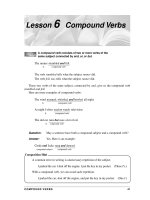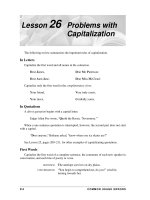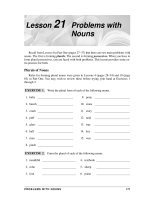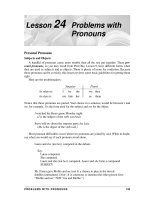Grammar And Usage For Better Writing - Review of Verbs, Nouns, and Pronouns
Bạn đang xem bản rút gọn của tài liệu. Xem và tải ngay bản đầy đủ của tài liệu tại đây (46.28 KB, 18 trang )
Lesson
10
Review of
Verbs, Nouns,
and Pronouns
REVIEW OF VERBS, NOUNS, AND PRONOUNS 61
To learn what part of speech a word is, ask yourself: How is the word used in its sen-
tence?
For example, in sentence 1 below, paper is a noun; it names a thing. In sentence 2, pa-
per is a verb; it expresses action.
1. I need more paper.
N.
2. The room will look better if we paper the walls.
V.
EXERCISE 1.
Like many words in English, each of the following can be a noun or a
verb, depending on how it is used in a sentence. For each word, write two sentences—
one using the word as a noun and the other using the word as a verb.
Sample:
bridge/bridge
We are about ready to cross the longest bridge in the state.
Gillian bridges the gap in age by taking an interest in her little sister’s dolls.
1. hound/hound
2. monitor/monitor
3. train/train
4. effect/effect
5. hedge/hedge
As you do these exercises, remember that verbs can be more than one word.
Question:
Is the verb in the following sentence mailed or have been mailed?
The letters have been mailed.
Answer:
have been mailed.
Note:
Whenever you are asked for the verb of a sentence containing a verb phrase, give
the whole verb phrase.
EXERCISE 2.
Name the verb in each of the following sentences.
Sample:
They must have lost their way.
1. Anything can happen.
2. You might have tried harder.
3. Is the trash being removed?
4. They should have been invited.
5. Jack should have been given another chance.
6. Elizabeth reads a book in a day.
7. Are we here yet?
8. Colleen is studying physics.
Nouns can be tricky, too. They change form depending on how they are used—as sin-
gular, plural, or possessive nouns. On the next page is a summary of the rules for forming
plurals of nouns.
must have lost
62 PARTS OF SPEECH
REVIEW OF VERBS, NOUNS, AND PRONOUNS 63
When to add
S
:
A. To most nouns: book—books. (See Rule 1, page 28.)
A–X. Exceptions to A:
man—men foot—feet mouse—mice
woman—women tooth—teeth goose—geese
child—children louse—lice ox—oxen
(See Rule 2 Exceptions, page 28.)
B. To most nouns ending in f: belief—beliefs. (See Rule 3, page 30.)
B–X. Exceptions to B:
leaf—leaves shelf—shelves
loaf—loaves thief—thieves
half—halves wolf—wolves
self—selves
C. To nouns ending in a vowel + y: way—ways. (See Rule 5, page 31.)
D. To nouns ending in a vowel + o: radio—radios. (See Rule 7, page 33.)
E. To most nouns ending in a consonant + o: auto—autos. (See Rule 8, page 33.)
When to add es:
E–X. Exceptions to E:
potato + es = potatoes echo + es = echoes
tomato + es = tomatoes veto + es = vetoes
F. To nouns ending in s: class + es = classes
sh: wish + es = wishes
ch: bench + es = benches
or x: box + es = boxes
(See Rule 2, page 28.)
When to change y to i and add es:
G. When a noun ends in a consonant + y: lady—ladies. (See Rule 6, page 31.)
When to change f to v and add s:
H. In the following three nouns ending in fe and their compounds:
knife—knives
life—lives
wife—wives
penknife—penknives
housewife—housewives
(See Rule 4, page 30.)
EXERCISE 3.
For each singular noun below, write (a) the plural and (b) the letter of
the rule for forming that plural. Take your rule letters from the preceding four boxes.
Samples:
SINGULAR PLURAL RULE LETTER
notebook
penknife
tax
baby
ox
1. pencil
2. leaf
3. child
4. tomato
5. louse
6. piano
7. sheriff
8. torch
9. echo
10. party
11. landlady
12. woman
13. jackknife
14. alloy
15. dash
16. stepchild
17. rodeo
A–Xoxen
Gbabies
Ftaxes
Hpenknives
Anotebooks
64 PARTS OF SPEECH
18. life
19. pie
20. monkey
EXERCISE 4.
As we have learned, a noun may have as many as four forms.
(1) (2) (3) (4)
POSSESSIVE POSSESSIVE
SINGULAR PLURAL SINGULAR PLURAL
student students student’s students’
On each line below, only one form of a noun is given. Write the other three forms of
that noun.
POSSESSIVE POSSESSIVE
SINGULAR PLURAL SINGULAR PLURAL
1. girl _______________ _______________ _______________
2. _______________ children _______________ _______________
3. _______________ teachers _______________ _______________
4. _______________ _______________ nurse’s _______________
5. _______________ _______________ _______________ women’s
Read the following. (Sentences have been numbered.)
1
J. R. R. Tolkien creates a complex fictional world, Middle Earth, in
his trilogy of books, The Lord of the Rings.
2
He called the first book The
Fellowship of the Ring.
3
In this book, Sauron is the Dark Lord of Mordor
who derived his power from the One Ring.
4
He wished to enslave
Middle Earth by using the One Ring but lost it before he could accom-
plish his goal.
5
Through odd twists of circumstances, the ring comes to a
hobbit called Frodo Baggins.
6
He and some friends form the Fellowship
and begin a journey to take the ring to the Cracks of Doom in the moun-
tain Oroduin, inside Sauron’s realm.
7
It is the only place where it can be
destroyed.
8
Frodo and friends have many adventures.
9
They are chased by
Ringwraiths, they pass through the Misty Mountains, and they proceed to
Lorien, where Lady Galadriel lives.
10
Here she tests them and gives them
gifts.
11
Eventually, Frodo decides his quest must lead him to Mordor, and
he leaves secretly to continue it alone.
continued
REVIEW OF VERBS, NOUNS, AND PRONOUNS 65
12
Though tales of fantasy, the Lord of the Rings books do echo truths
about the real world we live in.
13
They will bring you hours of great read-
ing.
EXERCISE 5
. Write the antecedents of the pronouns listed below.
Sample:
He (sentence 2)
1. He (sentence 4)
2. it (sentence 4)
3. It (sentence 7)
4. it (sentence 7)
5. They (sentence 9)
6. she (sentence 10)
7. them (sentence 10)
8. him (sentence 11)
9. it (sentence 11)
10. They (sentence 13)
Note:
In sentence 7, the two occurrences of it, with different antecedents, might make
for confusing reading. It is better to change one it back to what it refers to. For
example, change the second it to the ring.
EXERCISE 6.
Write:
1. the subject of the verb comes in sentence 5: ____________________
2. the direct object of the verb gives in sentence 10: ____________________
3. the indirect object of the verb gives in sentence 10: ____________________
4. the subject of the verb do echo in sentence 12: ____________________
5. the direct object of the verb will bring in sentence 13: ____________________
6. the indirect object of the verb will bring in sentence 13: ____________________
J. R. R. Tolkien
66 PARTS OF SPEECH
EXERCISE 7.
List 10 proper nouns and 10 common nouns from the passage.
PROPER COMMON
1.
2.
3.
4.
5.
6.
7.
8.
9.
10.
Recall that in less formal writing and conversation, contractions may be used.
EXERCISE 8.
Which contraction beginning with a pronoun can replace the italicized
words? Write your answer in the space provided.
Samples:
You are wasting time.
Ask her where the teams are playing.
1. We would be glad to go along.
2. Do you know if he is home?
3. My friends and I will help you.
4. You have no time to lose.
5. Terry will be there.
they’re
You’re
REVIEW OF VERBS, NOUNS, AND PRONOUNS 67









